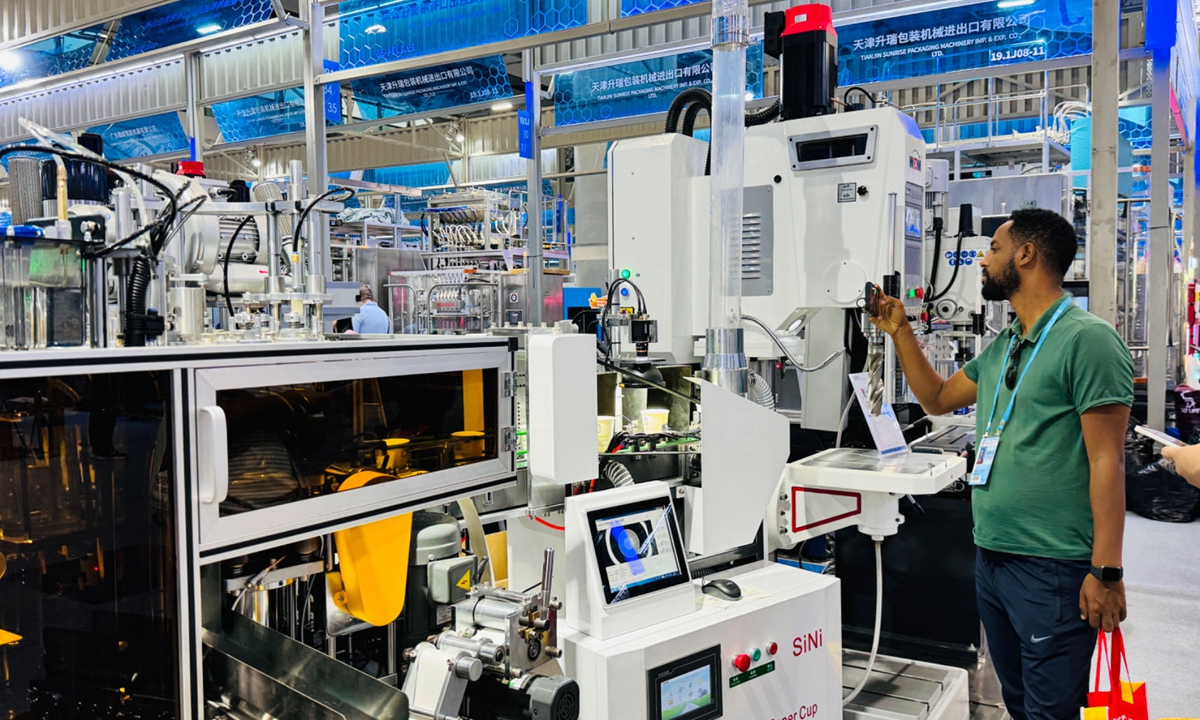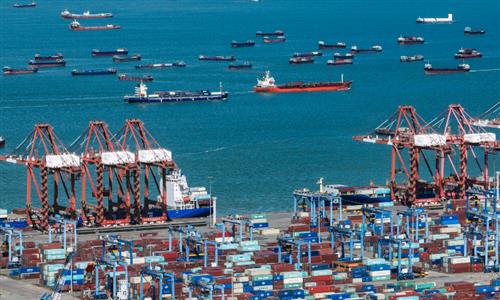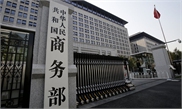
A visitor takes photos of an automated production line on display at the 135th session of the Canton Fair in Guangzhou, South China's Guangdong Province, on April 16, 2024. Photo: Chi Jingyi/GT
The second phase of the 135th session of the China Import and Export Fair, also known as the Canton Fair, kicked off in Guangzhou, South China's Guangdong Province on Tuesday, attracting about 10,000 domestic and international enterprises to display products such as daily consumer goods and gifts.
Observers said that the spectacular event is an epitome of China's stable and sound foreign trade. Refuting Western media outlets that bad-mouth the country's foreign trade sector and economic prospects, they said that the potential of the Chinese economy is far from peaking, since the development of new quality productive forces will bring revolutionary reform to labor productivity and inject long-lasting impetus into the economy.
With the theme of "Quality Home Furnishings," the second phase has attracted 9,820 on-site exhibitors, and 220 companies from 30 countries and regions will participate in the exhibition, according to the official website of the Canton Fair.
It's worth noting that 144 companies from 18 Belt and Road Initiative (BRI) participant countries are attending the fair, accounting for about 65 percent of all foreign exhibitors.
"The sizable increase in overseas buyers during this year's Canton Fair has greatly strengthened our confidence in getting new clients and exploring new markets," Wen Ting, a manager with Shenzhen Fu Xingye Import and Export Co, said.
More overseas companies prefer to diversify their markets amid shocks including the Red Sea crisis and global supply chain adjustments.
These BRI countries are an important source of clients for us, as most of our buyers come from emerging markets, Ying Xiuzhen, president of China-Base Ningbo Foreign Trade Co, told the Global Times.
Launched in 1957 and held twice yearly, the fair is considered a major gauge of China's foreign trade. In the first quarter of the year, exports from the world's second-biggest economy rose 4.9 percent year-on-year, reaching 5.74 trillion yuan ($792.12 billion), according to the General Administration of Customs.
Analysts said that the sound performance of the country's foreign trade underscores the resilience, potential and vitality of China's economy, debunking West's claiming that "China's foreign trade winter is coming," or promoting the "Peak China" musings and other fallacies.
Wen Bin, chief economist at China Minsheng Bank, said that exports will continue to grow in the second quarter due to a lower base last year and macro-policies to stabilize foreign trade.
Although some Western politicians and organizations have made accusations about so-called overcapacity in China's new-energy sector, adding uncertainties to the country's foreign trade, external demand for Chinese products remains solid, Wen told the Global Times, and overall global trade is expected to gradually recover in 2024.
The WTO said in a new forecast on April 10 that the volume of world merchandise trade is expected to grow by 2.6 percent this year and 3.3 percent in 2025.
The Chinese economy's overall trend of steady, its long-term growth will not change, and the country will cultivate advantages supporting its long-term growth on the basis of achieving economic prosperity in the short term, analysts said.
"The Chinese economy is far from peaking. If China's GDP continues to grow at 4-5 percent for the next decade, it's still much faster than that of the US," He Weiwen, a senior fellow at the Center for China and Globalization, told the Global Times on Tuesday.
The development of new quality productive forces - which features new technologies such as big data, artificial intelligence and new-energy vehicles - will bring revolutionary reform to labor productivity and thus higher growth rates for the world's second-largest economy, He said.
More efforts are needed to encourage independent innovations and deepen institutional reform and opening-up so as to cooperate with enterprises across the world, He said.
Conducting a tour of the booths of multiple enterprises at the Canton Fair last week, Chinese Premier Li Qiang said that the fair should play a bigger role in expanding China's high-level opening-up and promoting the building of an open world economy.
Li encouraged enterprises to continuously improve their research and development capabilities, and strive for digital, intelligent and green transformation.
He, the research fellow, expressed optimism about the future of China's foreign trade despite challenges such as US decoupling and restrictions.
"On the one hand, China's foreign trade with neighboring countries such as those in ASEAN and Russia sees stable growth. On the other hand, China's exports to developed economies like the US are gradually recovering since cooperation meets both sides' needs and supply chains are difficult to break," He said.



